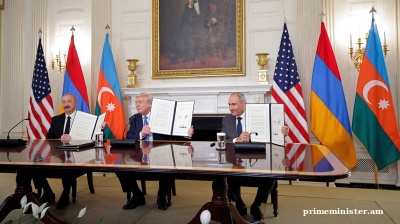Tajikistan has protested to Moscow over what it says is the unfair treatment of its citizens in Russia, pointing to around 1,000 Tajik nationals stranded at Moscow's Vnukovo airport "without the provision of appropriate sanitary conditions" and hot meals.
The Central Asian country’s foreign ministry on April 29 summoned Russia's ambassador to Dushanbe to register a protest over the situation in what amounts to a rare public dispute between the post-Soviet allies.
Concerns about xenophobia faced in Russia by Central Asian migrant workers and visitors have mounted since the March 22 terrorist attack on Crocus City Hall in outer Moscow that took the lives of more than 140 people. Four Tajiks were quickly arrested and charged with committing the gun attack on the concert venue, while several others and a Kyrgyzstan-born Russian national were also taken into custody, accused of having roles in the network that lay behind the terrorist atrocity.
On April 27, given the intensity of the backlash in Russia against Central Asians, Tajikistan urged its nationals to refrain from travelling to Russia “unless [the travel is] absolutely necessary.”
The Tajik Foreign Ministry said that Tajik citizens were facing difficulties at Vnukovo as well as other Moscow airports due to tightened passport and customs controls brought in since the terror attack.
Hundreds of arriving Tajiks have been barred from entering Russia, leaving them inside the airports attempting to find a resolution.
The ministry said it was seriously concerned by the frequency of cases in which Tajik citizens in Russia were treated in a deliberately negative way.
It made no mention, however, of the Tajik men that have been charged with the concert hall attack.
There is growing evidence that impoverished and repressed Tajikistan has a major problem with the radicalisation of citizens who then go on to commit terrorist attacks abroad on behalf of jihadist groups, particulary Afghanistan-based Islamic State – Khorasan Province (ISKP, or ISIS-K).
Russia Foreign Ministry spokeswoman Maria Zakharova said on April 29 that Russia has temporarily tightened border controls as a measure to prevent terrorism, but was moving to resolve long delays on the frontier.
“We especially stress that such steps are of a temporary nature and do not take into account the nationality of those arriving,” she said.
Tajikistan is a member of a Russian-led security bloc and hosts the largest Russian military base outside Russia. Its economy depends heavily on remittances from more than a million Tajik migrant workers employed in Russia, mostly in construction and agricultural work.
Analysts have warned that the loss of a substantial number of guest workers would worry Russian President Vladimir Putin due to already marked labour shortages in Russia at a time when officials have switched to “war economy” mode and need to keep various economic sectors running at full pelt. Around a third of its GDP stems from money sent home from abroad, mostly Russia.
Previously, on April 12, Tajik Foreign Minister Sirojiddin Mukhriddin complained that "an ill-conceived information campaign" in Russia was producing "a negative perception" of Tajiks.
He also condemned the treatment of the Tajik suspects held in connection with the Crocus City Hall attack, indicating he believed they had been tortured in custody.
When they appeared in a Moscow court, the four individuals had bruised and swollen faces and showed other indications of having been severely beaten. There were unconfirmed reports that one of the accused had his ear cut off during his arrest.
News

Albania aims to revive domestic defence industry as it hosts top Nato officials
Albania ended domestic arms production after the collapse of its communist regime but is now working to restart the industry.

Russian team comes dead last in Hungary’s annual grave digging contest
In a surprise move, Hungary invited a Russian team to its annual grave digging competition. In an even bigger surprise the team from Novosibirsk came dead last.

Flydubai expands Kenya operations with new Nairobi flights and increased Mombasa services
Flydubai launches new Nairobi flights from October 15 and increases Mombasa to daily service, bringing total weekly Kenya flights to 11 as part of African expansion.

Small, medium-sized countries establish Future of Investment and Trade Partnership
UAE joins 13 countries in establishing Future of Investment and Trade Partnership to promote open trade, strengthen supply chains and address emerging economic challenges globally.



